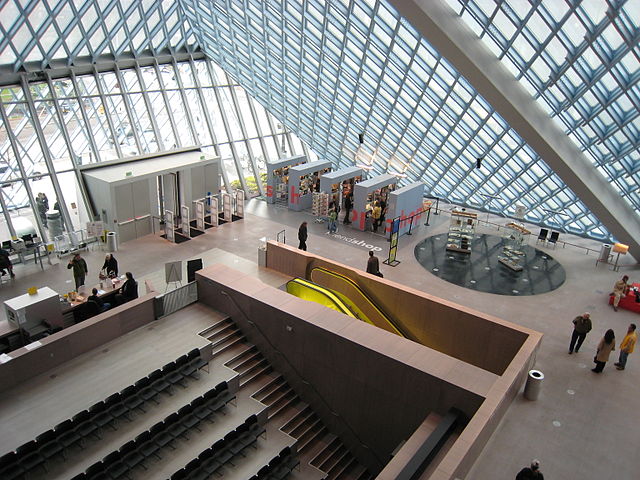
The Thammasat University Library has acquired a useful new guide to thinking about libraries in terms of the communities which they serve. The New Librarianship Field Guide discusses libraries and society, as well as attitudes of librarians. It is shelved in the General Stacks of the Pridi Banomyong Library, Tha Prachan campus. The New Librarianship Field Guide suggests how librarians can make change occur in their communities by focusing on education. Its author, Professor R. David Lankes, suggests that librarians are no longer just people who wait to be asked about books. Instead, they can create knowledge in their communities. A library’s true collection, in addition to books, journals, and databases, is the community where it is found. A library is defined as
a mandated and facilitated space supported by the community, stewarded by librarians, and dedicated to knowledge creation… A library should be a participatory platform that allows a community to share passions, expertise, and resources.
There are many economic, educational, cultural, and democratic reasons for having libraries in any society. Different types of libraries, such as university, national, public, or school libraries, create different conditions. Yet in all these kinds of institutions, some things about the purpose of the librarian remain constant. Librarians tend to be good at teamwork, helping to plan useful instruction for librarians of the future. They are also imaginative, creating new types of services that are designed to best suit the communities where they are located. The New Librarianship Field Guide underlines that being a librarian is a worthy profession with high moral and ethical standards. In our commercialized societies where profits are valued over everything else, libraries can offer information about things that may not immediately translate into profits. The New Librarianship Field Guide explains that libraries are not mainly about the buildings which house them, but instead about the librarians who work there. Librarians are described as
principled professionals working with their communities in transformative social engagement.

For this reason, librarians should participate in online communities as a form of social engagement that may lead to positive change. Professor Lankes advises librarians who may be modest about their own knowledge about some subjects:
Teach by learning, try by collaborating. Your credibility and respect in the community come from your transparency and openness, not by your ability to ‘know it all.’
Ideally, university librarians should help to plan research. One way to do so would be to have university presses reflect the communities where they are located. University presses should be encouraged by librarians to produce applications and academic course materials:
Gone are the days when academic libraries were simply repositories of books and other materials, set off to the side and not actively serving the missions of their universities. What’s needed today is a commitment by university administrators, faculty, students and librarians to reinvent the whole concept of academic libraries.
Professor Lankes informed an interviewer in 2016:
One area where I see academic libraries taking the lead is in open-access publishing. There are some very notable libraries not only raising awareness of open-access publishing but actively guiding university policy making and building platforms for new forms of scholarly communication.
The TU Library owns a number of other books written and coedited by Professor Lankes, including The Atlas of New Librarianship; Digital Reference Service in the New Millennium: Planning, Management, and Evaluation; Implementing Digital Reference Services: Setting Standards and Making it Real; The Virtual Reference Experience: Integrating Theory into Practice; The Virtual Reference Desk: Creating a Reference Future; and Virtual Reference Service: From Competencies to Assessment. Professor Lankes is the director of the University of South Carolina’s School of Library and Information Science. He earned a Ph.D. in information transfer at the Syracuse University School of Information Studies in Syracuse, New York and an M.S. in telecommunications, also at Syracuse University.

On his website, pdfs of some of Professor Lankes’ books may be downloaded for free. One of them, Expect More: Demanding Better Libraries For Today’s Complex World, suggests:
I believe that great librarianship, the kind you should expect, crosses boundaries. Great librarianship is great whether it is in academia, the public sphere, or K–12 schools. For that reason, this book is not about expecting more from public libraries or from school libraries, but from all libraries. School libraries have a lot to teach all good libraries about issues of assessment and learning. Public libraries have a lot to share about working with a wide range of demographics. Academic libraries understand the power of knowledge creation. Corporate libraries, and the ever-present bottom line, can teach us all about measuring impact. Throughout this book I will use the word communities a lot. I mean this term in a very broad sense…Communities form where people live, and where they study or work. A university is a community, as is a law practice, as is a hospital. My goal in this book is to show you the potential of libraries to improve your community and society in general. That potential will never be realized if libraries or their communities build up rigid boundaries of library types. You can use what works in little libraries to inform your big library. Ideas that start in public libraries can be successfully used in academia or businesses… Innovation comes from everywhere and it is up to us to fit that innovation to our world.
Professor Lankes adds:
Some of you already have libraries and librarians that exceed your expectations. Wonderful. Your action plan is simple: support them. This is not just about money but also about letting them hear your voice and share your dreams, and taking ownership in the library itself. You need to spread the word that your library is alive and well and is more than what folks expect… You should expect a great library to seek out innovative ways of supporting learning. A great library should provoke and prompt conversation. The librarians should expect you to engage in those conversations…To be sure, great libraries require funding. You can’t expect a great library to stay that way by cutting staff and replacing true librarians with clerks… [G]reat libraries come from great librarians. Great librarians experiment with new services and are not afraid to fail rapidly. There is a difference between a failure and a mistake. A mistake is when you do something wrong and don’t learn from it (so you often repeat it). A failure is something you try that is a little bit beyond your reach, but you can figure out how to do it better next time. If your librarians are not trying new things and pushing the boundaries, or are afraid to try something because they might fail—they are afraid of learning (or worse, victims of bad management that rewards only success and not learning). If every new thing a library does, no matter how big (starting a gaming program) or small (accepting canned foods in place of fines), happens only after the formation of a committee and a three-month planning process, then you are killing innovation and your library is not about learning and playing.
In The Atlas of New Librarianship Online, another book available for free download online, Professor Lankes notes:
The mission of librarians is to improve society through facilitating knowledge creation in their communities. There are some important things to note about this mission statement. First, it is not the mission of a library or an organization; it is the mission of a librarian. It focuses the field on information professionals, but it also makes the responsibility personal to an individual. It doesn’t matter whether a librarian works in a library or hospital, a law firm, a search engine company, or out of his or her own home; the mission still stands.

(All images courtesy of Wikimedia Commons)
